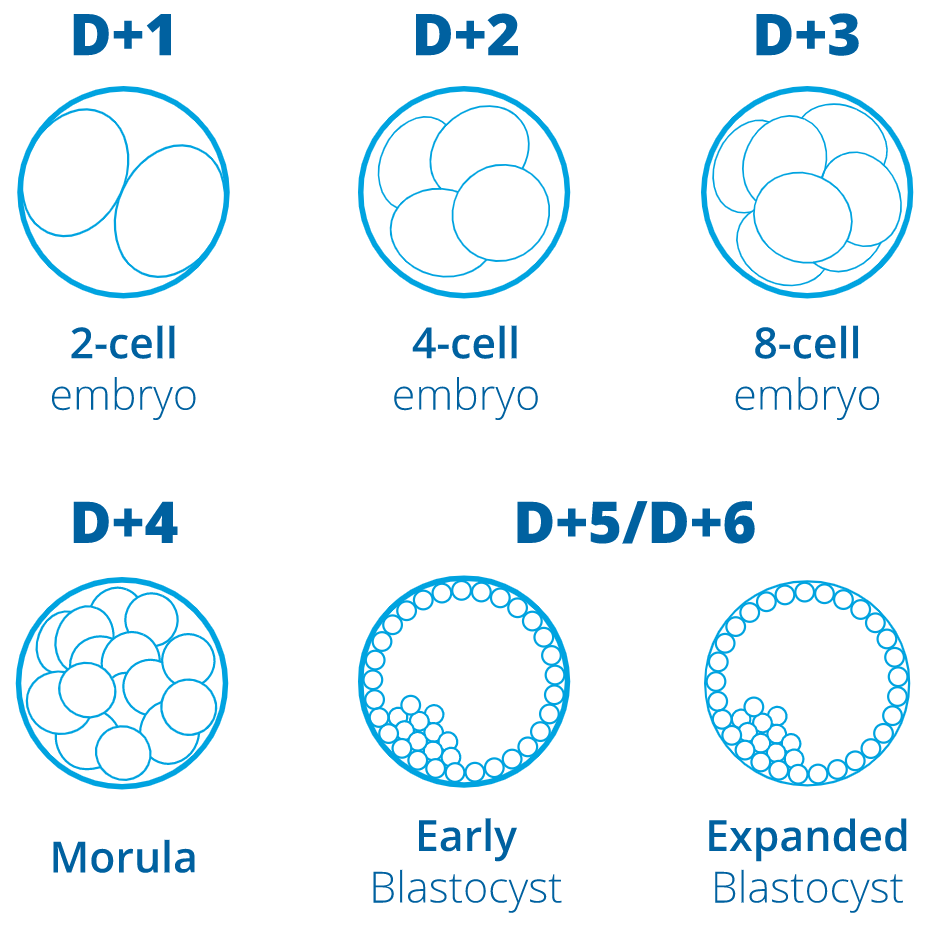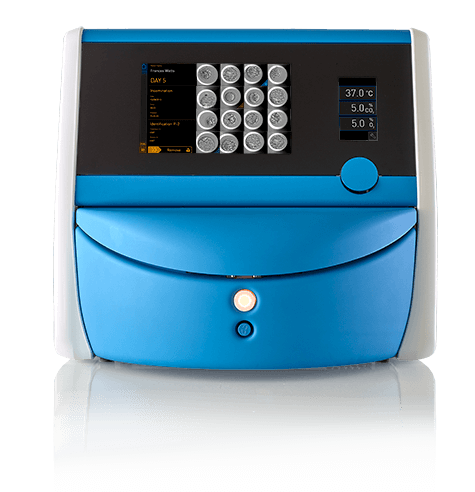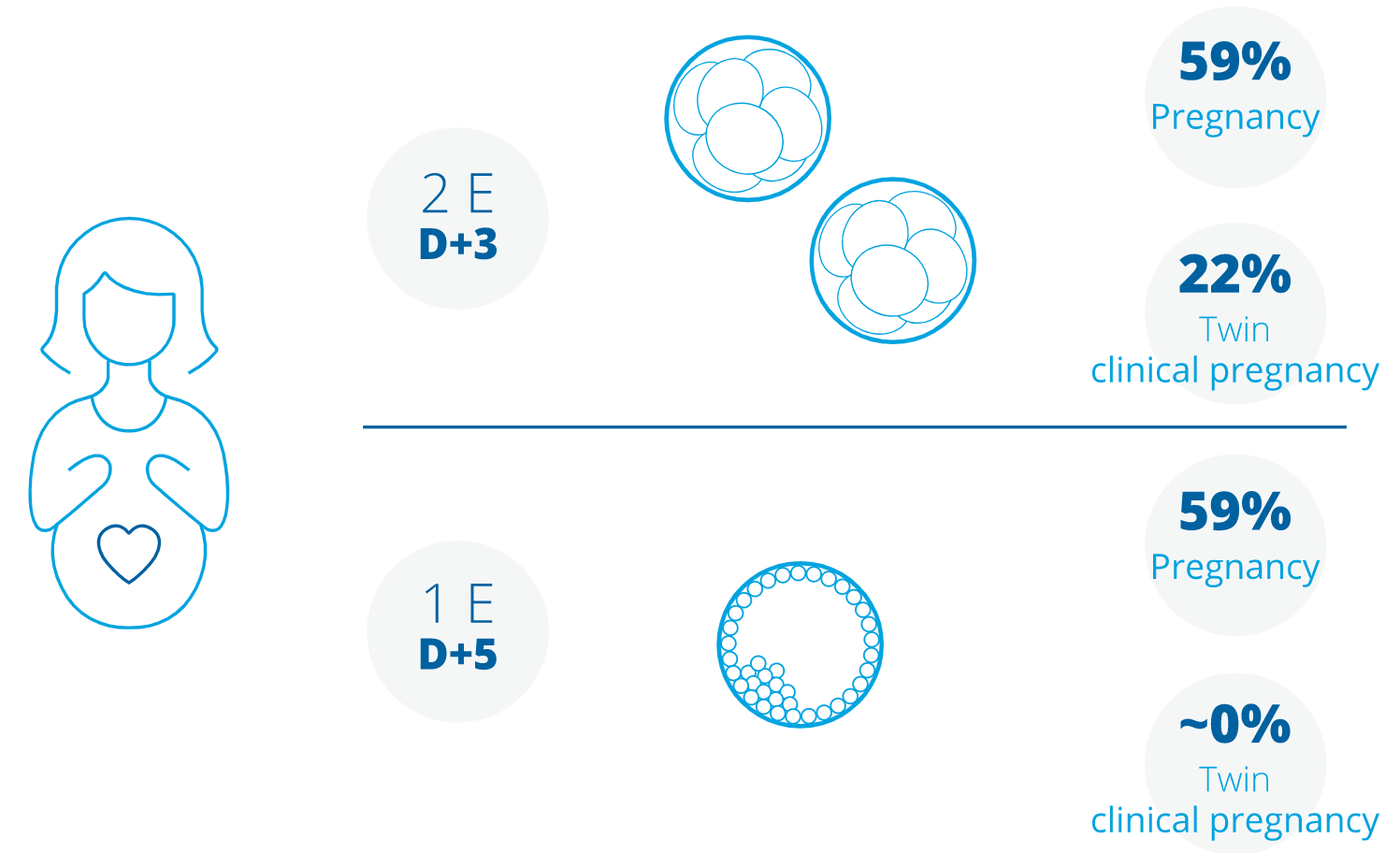Blastocyst culture and transfer
What is blastocyst culture?
Blastocyst culture involves keeping the embryos in special conditions in the laboratory until day 5 or 6 of development after follicular puncture. This more mature stage that the embryos reach is called the blastocyst stage and, according to a study carried out by Eugin on more than 500 patients, we were able to confirm that the transfer of 1 blastocyst stage embryo to the uterus produces pregnancy rates comparable to the transfer of 2 cell stage embryos (day +2 or +3).
Blastocyst culture involves keeping the embryos in special conditions in the laboratory until day 5 or 6 of development after follicular puncture. This more mature stage that the embryos reach is called the blastocyst stage and, according to a study carried out by Eugin on more than 500 patients, we were able to confirm that the transfer of 1 blastocyst stage embryo to the uterus produces pregnancy rates comparable to the transfer of 2 cell stage embryos (day +2 or +3).


How is a blastocyst transfer performed?

In an In Vitro Fertilisation (IVF) treatment, using either your own or a donor’s eggs, the eggs are extracted and fertilised in the laboratory with your partner’s sperm, or that of a sperm donor. These pre-embryos are cultivated in our state-of-the-art incubator called EmbryoScope+ until day +5 or +6, depending on the quality of the embryos.
Your doctor, along with Eugin’s team of embryologists, will advise you on which is the best option in your case. Thanks to this incubator, we can closely observe, without altering the culture conditions, your embryos’ development. You will also be given a film recording of your embryos so that you have a souvenir of this process.
When the day comes, we will select the embryos with the best developmental characteristics and insert them into a catheter to be placed inside the uterus.
When the day comes, we will select the embryos with the best developmental characteristics and insert them into a catheter to be placed inside the uterus.
What are the advantages of blastocyst stage embryo transfer?
Blastocyst stage embryo transfer increases pregnancy rates compared to cell stage transfer (at 2-3 days of development).
They provide improved transfer quality as we will have been closely monitoring them thanks to our cutting-edge EmbryoScope+ technology.
They provide increased implantation capacity in the uterus because they are at their most mature stage of development.
It eliminates any possibility of twin pregnancies because we will just implant a single embryo.
Success rates
The success rate for the transfer of a blastocyst stage embryo is the same as for 2 cell stage embryos, on day +3, which means a 59% probability of pregnancy for women under the age of 35.
At the same time, a blastocyst stage transfer increases the safety of the treatment, since it virtually eliminates the possibility of twin pregnancies, which carry an obstetric risk for both mother and child.


In which cases is it recommended?
Any woman who wants to undergo in vitro fertilisation treatment, whether with her own eggs or using donor eggs, may choose to have her embryos transferred at the blastocyst stage provided this is possible. One should bear in mind that not all embryos may reach this stage as this depends on different factors (the woman’s age, the quality of the semen, and so on).
Based on the possibility of optimizing the success of your treatment, while ensuring your safety and comfort at all times, we will try to extend the culture of your embryos to the blastocyst stage whenever possible. This decision will always be the result of the active participation of the medical team, our embryologists and patients. In this way, we ensure that a good quality embryo is implanted. At Eugin we accompany you all the way.
Do you have a question that can’t wait?
Request an appointment with our team or ask our experts.
Do you have a question that can’t wait?
Request an appointment with our team or ask our experts.

